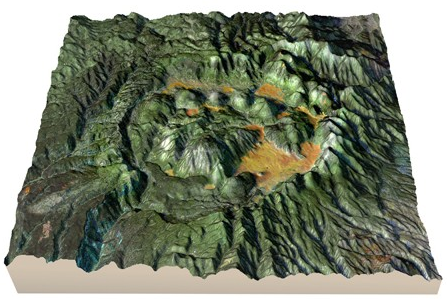A scientist at a canyon notices observes a dike cuts across the sedimentary layers. How did it get there?
A) It was there before the layers; the layers built upon above and beneath it over millions of years.
B) There was an earthquake ? a layer of igneous rock was thrust into the sedimentary layers..
C) Magma rose from within the earth and intruded the sedimentary layers.
D) A piece of a volcano broke off beneath the earth..
Answer: C
You might also like to view...
One advantage of wind power is that it
A. is limited to land areas B. is not noisy. C. does not interfere with wildlife or habitats. D. produces little to no direct carbon dioxide emissions. E. does not require a lot of space.
What type of eruption formed the main volcanic features in this figure?

A) Fluid lava flows
B) Large pyroclastic eruptions
C) Lava fountain
D) Fissure eruptions
E) Eruptions beneath the seafloor
Tornadoes can be associated with this cloud type
What will be an ideal response?
Between 1.3 and 1.0 billion years ago, the Grenville orogeny occurred in the supercontinent __________
Fill in the blank(s) with correct word